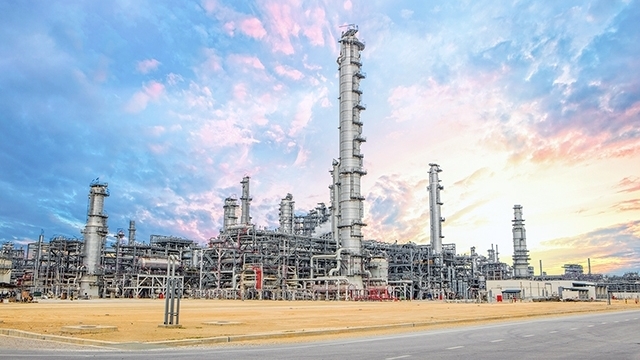



Nghi Son Petrochemical Refinery has commenced operation. (Photo:
NDO/Minh Duc)
Depending on the world market
The world oil market suffered from unpredictable developments last year. Geopolitical instability in the Middle East, the Organisation of the Petroleum Exporting Countries (OPEC) cut supply, and the trade war between the US and China have resulted in turmoil in the market. After falling prices in the first two months of 2018, the world crude oil price increased strongly, starting from March. As of October 2018, the oil market saw oil prices setting the highest level in the last four years as Brent oil prices hit US$86.29 a barrel, while WTI oil prices were at US$76.41 per barrel. However, from the second half of October, world oil prices have continuously plunged. Oil prices dropped by over 30% to below US$60/barrel at the end of November compared to the peak in October. To overcome the price drop, in early December, the member countries of OPEC and OPEC outsiders agreed to cut crude oil production by 1.2 million barrels a day in 2019, despite supply increase pressure from the US. This has helped ease concerns about global oversupply.
According to economists, 2019 will likely still witness oversupply due to increasing oil production volume, while consumption demand tends to decrease as economic growth in a number of countries decelerates, leading to global consumption reaching only about 1.4 million barrels per day. In the past year, domestic gasoline prices also fluctuated. Specifically, the gasoline price was adjusted 24 times, in which, E5 Ron 92’s maintained its price 10 times, was increased seven times with a total increase of VND3,324 per litre, and reduced seven times with total reduction of VND 4,780 a litre, while 0.05S diesel kept its price five times, had 11 increases with a total increase of VND 4,137 a litre, and eight price reductions with a total reduction of VND3,305 a litre.
Evaluating the domestic petroleum market, Chairman of the Vietnam Petroleum Association (VINPA) Phan The Rue said that Vietnam's petroleum market in 2018 was relatively stable, with supply ensured for demand of the country’s development and fully meeting consumer demand. Last year, Vietnam's petroleum consumption was at 15-16 million tonnes. Currently, the growth and use of petroleum in the country is very low, increasing at only about 7% compared to 2017 and an equivalent increase this year has been forecast, mainly serving consumer demand for cars, motorbikes and public transport. Therefore, the possibility of high volatility in the petroleum market is not high.
Boosting a competitive petroleum market
From January 1, 2018, only two petrol products are being sold on the market, Ron 95 and E5 Ron 92 gasoline. According to statistics of the Domestic Markets Department (Ministry of Industry and Trade), last year the consumption volume of E5 Ron 92 accounted for over 40% of total domestic consumption of gasoline. The Dung Quat Biofuel Plant restarted in mid-October 2018 and the Nghi Son Refinery has just successfully exported its first batch of commercial products to the domestic market, including gasoline Ron 95, Ron 92 and diesel, which is good news for Vietnam's petroleum market.
Previously, Vietnam was mainly a petroleum importer, but now with the operation of the Dung Quat and Nghi Son oil refineries, the country is active in ensuring supply by itself, at about 60-70% of domestic demand, and has to only import from 30-40%. Furthermore, petroleum businesses are constantly investing and deploying a series of new services, such as automatic petrol sales and card payment, and upgrading emission standards from Euro 2 to Euro 4 and 5, showing the interest and investment in the right direction from enterprises to meet the increasing demands of consumers.
However, a number of shortcomings in the operation of the domestic gasoline market have not opened the petroleum retail market for enterprises with 100% foreign invested capital, while also affecting the consumer market. Notably, the current petroleum management policy, which relies heavily on administrative imperative tools, has not created favourable conditions for the market to operate under the market mechanism, not really bringing practical benefits to the consumers and businesses. For example, the nature of setting up a price stabilisation fund is that consumers have to pay in advance to make up for this fund. The blameless use of the fund with administrative intervention has distorted the market and kept trillions of VND in the fund for non-trading, which is a huge waste. The stipulated time between two consecutive price adjustments at least 15 days in case of price increases and maximum of 15 days in case of price reduction has made it difficult for domestic retail prices to catch up with the developments of world petroleum prices.